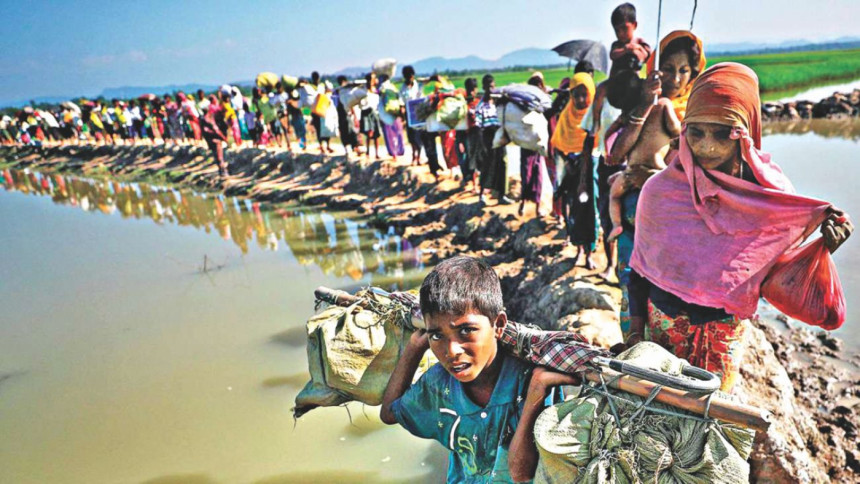THE ROHINGYA CRISIS at ICC and UNSC

The widespread violence against Rohingya Muslims causing civilian deaths, rapes, and forced deportation to Bangladesh has been internationalised by a series of national and international actions. Recently on 9 April 2018, the Chief Prosecutor of the International Criminal Court (ICC) filed a petition with the ICC to rule whether the Prosecution has the power to initiate an investigation into the mass cross-border deportations of Rohingya Muslims. The petition is currently under review by a pre-trial judge of the ICC. Myanmar claimed that the ICC has no jurisdiction (Press Release of 13 April 2018). Myanmar is right because the perpetrators are Myanmar soldiers and the place of the commission of atrocities is the Rakhine state of Myanmar, which is not a member of the ICC. Does this mean the ICC lacks jurisdiction over the Rohingya crisis?
Does forced deportation constitute an international crime under the ICC Statute? ICC Article 7(d) enlists 'deportation or forcible transfer of population' as a constituent element of crimes against humanity, in addition to rapes and sexual violence (Article 7g) and other inhumane acts causing great suffering (Article 7k). These offences have long been recognised as crimes against humanity, including the Nuremberg Charter Article 6c (deportation); Tokyo Charter Article 5c (deportation); Yugoslav (ICTY) Statute Articles 5d (deportation), 5g (rape), 5h (persecution), 5i (other inhuman acts); Rwandan (ICTR) Statute Articles 3d (deportation), 3g (rape), 3h (persecution), 3i (other inhumane acts); and Sierra Leone Special Court Statute Articles 2d (deportation), 2g (rape), 2h (persecution), 2i (other inhumane acts). The Yale Law School International Human Rights Clinic Study published in October 2015 found tangible evidence of genocide in the Rakhine State of Myanmar. Evidently, the offence of deportation, rape, persecution, and other inhuman acts committed in Rakhine comes squarely within the purview of crimes against humanity under Article 7 of the ICC Statute.
Does the ICC Prosecutor possess the power to initiate a probe into 'intentionally deported across the international border into Bangladesh'? The ICC Prosecution is an independent organ with power, among others, to launch investigation proprio motu (on own impulse or accord) into an alleged commission of the ICC crimes based on its own information from any sources without any referral by any ICC member or the UN Security Council (Articles 13, 15). This is called the automatic trigger mechanism of the ICC Prosecution under which it initiated a proprio motu investigation in November 2009 into the reported commission of crimes against humanity during the post-2007 election violence in Kenya. Since forced deportation and other associated crimes in Myanmar are the ICC crimes under its Statute, there appears to be no legal bar for the ICC Prosecution to commence a proprio motu probe. There is no dearth of evidence testifying various atrocity crimes committed by Myanmar troops against Muslim civilians in Rakhine State. Reports of NGOs, such as UNHCR, Amnesty International provide an account of summary killings, mass rapes, and arson since August 2017. Seven Myanmar soldiers have been given ten years rigorous imprisonment by Myanmar itself for the extrajudicial killings of ten Rohingya Muslims. The UN, EU, and some states (Turkey, the Philippines, and some Arab states) termed the Rohingya crisis as ethnic cleansing and genocide.
There are many international judicial decisions on forcible deportation, ethnic cleansing, and mass rapes and killings constituting crimes against humanity.
These judgments inclusively include among others: The International Court of Justice (ICJ) in Bosnia and Herzegovina v Serbia and Montenegro, 2007 ICT Reports 43 and Croatia v Serbia, 2015 ICT Reports 3; the ICTY judgments in Prosecutor v Tihomir Blaskić, IT-95-14-A, 29 July 2004, para 135, 152-53; Prosecutor v Zoran Kupreki et al, IT-95-16-T, 14 January 2000, para 631. Therefore, both international criminal law and ample judicial precedents exist to support the prosecutorial launch of a proprio motu probe to unearth Rohingya massacre in Myanmar and the ICC Pre-trial Chamber to bring the perpetrators to face the full force of international criminal law.
The real challenge would be to overcome the ICC non-member status of Myanmar. This challenge can be overcome by the involvement of the UN Security Council (UNSC), which can refer the Myanmar situation to the ICC under Articles 13(b) and 87(7) of the ICC Statute. The UNSC, acting under UN Charter Chapter VII, is mandated to make a referral to the ICC Prosecutor for investigation. Since Chapter VII is mandatory for all UN members, such referral enables the ICC to exercise its jurisdiction over non-ICC members, such as Myanmar. The first such referral was the Sudanese Darfur Situation in 2005, followed by the Libyan Situation in 2011. Both Sudan and Libya are not ICC party like Myanmar. The UNSC has legitimate grounds to be proactive as the UN accused Myanmar of ethnic cleansing, a possible 'hallmarks of genocide' and Myanmar massacre demands 'attention, action' (The Daily Star, 13 February and 11 April 2018). The UNSC itself expressed its commitment to keep the Rohingya situation high on its agenda and has a plan to visit Rakhine State as a fact-finding mission (The Daily Star, 14 February and 3 April 2018).
In the past, the UNSC and ICC dealt with referral cases discriminatorily. The UNSC was very quick to refer Sudanese President Omar Al Bashir and Libyan leader Muammar al-Gaddafi and Saif al-Islam Gaddafi to the ICC Prosecutor, which launched these cases at a record speed. From the time of referral to open investigation, the Prosecutor took only three weeks for Sudan and less than a week for Libya, which 'is highly unusual' as it takes 'years to decide whether or not to open an investigation'. But the UNSC made no such referral yet of the unabated commission of ICC crimes in Syria and Yemen – a double standard due to the self-serving interests of its permanent members, the majority of whom are not ICC members. The Myanmar Situation presents an opportunity for the UNSC and ICC to stand above geopolitical rivalry by being active in ending impunity for heinous international crimes.
Since its operation from mid-2002 till date, the ICC indicted individuals - all from Africa. Does the ICC pursue the African situations disproportionately? Does this imply that all other continents are free from the ICC crimes? This 'Africa only' focus of the ICC has generated political backlash, exemplified by the 21st Summit of the African Union (AU) on 26-27 May 2013 in which its 54 AU members held a consensus view that the ICC process conducted in Africa was flawed and tainted by racism and urged united stand against the ICC. The US and other powerful NATO members were free to commit the ICC crimes in Iraq and Afghanistan, Russia in Chechnya and Georgia, China in Tibet, and Israel in the occupied Palestinian territories with complete impunity. The UNSC referral triggering the ICC investigation seems to be operating only in weak States, not in powerful States and their allies.
Neither the UNSC nor the ICC has yet addressed the perennial problem of their competence and jurisdiction. These lacklustre and discriminatory performances have created an extraordinary public confidence crisis and popular scepticism about the exercise of the ICC referral jurisdiction. The Rohingya crisis presents yet another damage controlling opportunity for the UNSC to refer the situation to the ICC Prosecution, which must act expeditiously as both organs did in case of Sudan and Libya. A failure would mean a support for impunity to prevail over justice and the rule of the jungle over the rule of law. Should failure eventuate, it would further erode public confidence in these two important organs.
The writer is Professor of Law and Director of Higher Degree Research, Law School, Macquarie University, Sydney, Australia.


 For all latest news, follow The Daily Star's Google News channel.
For all latest news, follow The Daily Star's Google News channel. 



Comments